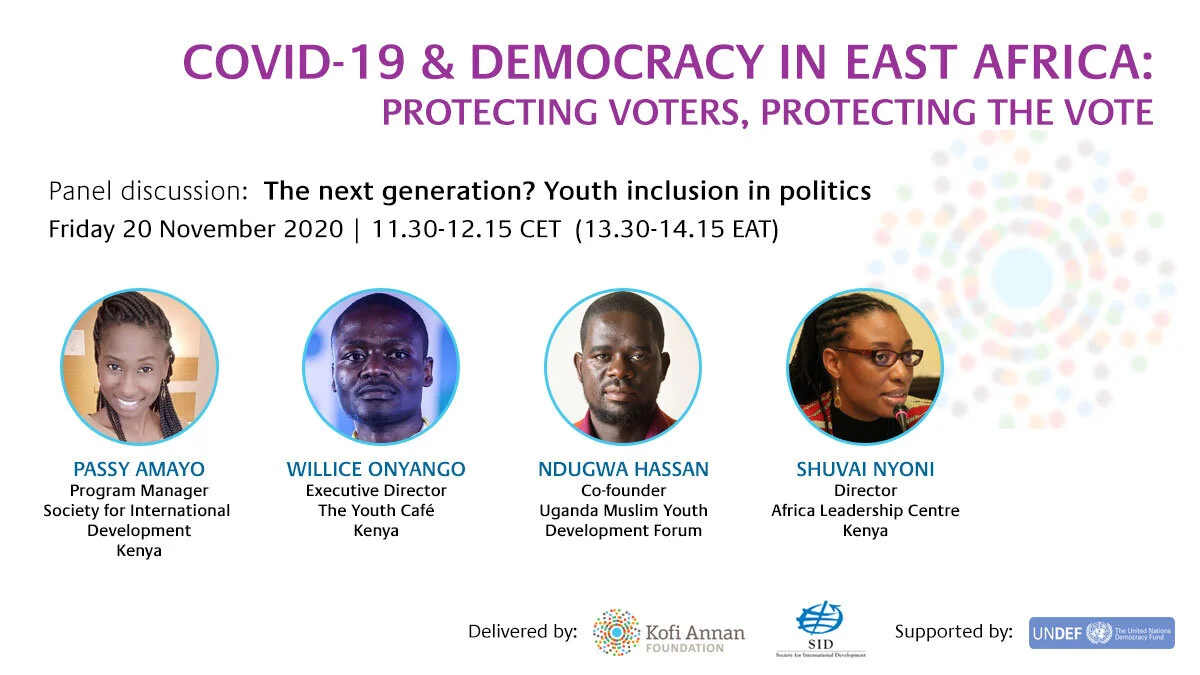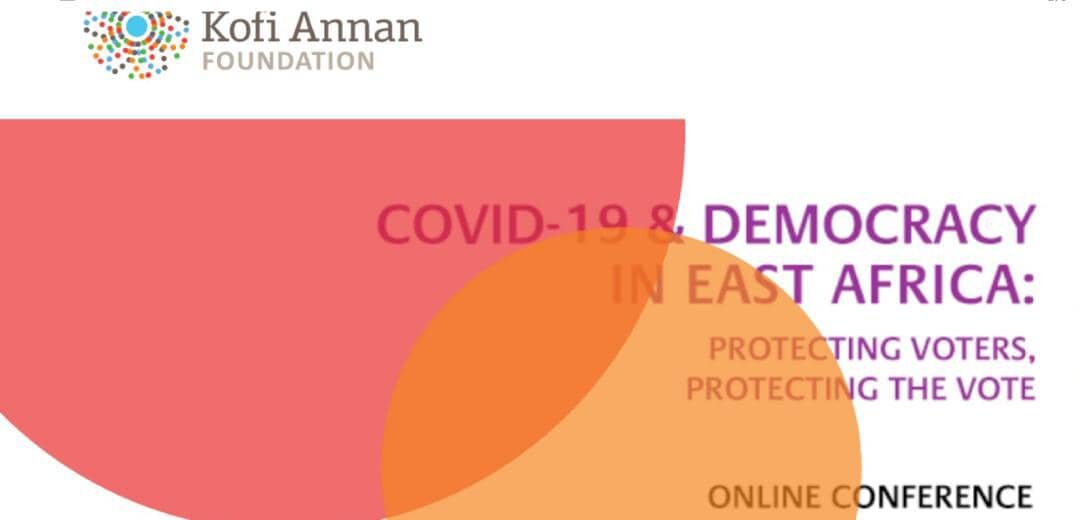The Next Generation: How Might We Include Youth In politics?
The median age in Eastern Africa is 18.1 years, yet youth is largely excluded from power. What future do young people want and how can they increase their participation in politics?
This was the overarching question that formed an esteemed panel of young leaders, including The Youth Cafe’s Executive Director, at the recently conducted online conference under the theme of COVID-19 & DEMOCRACY IN EAST AFRICA CONFERENCE from 19-20 November 2020. The conference was organized by The Kofi Annan Foundation, in collaboration with the Society for International Development (SID), with the support of the United Nations Democracy Fund (UNDEF), to host an online conference on exploring the state of democracy in East Africa in the context of the coronavirus pandemic – what challenges is the region facing and what opportunities could be identified particularly when it comes to protecting voters and protecting the vote?
The keynote speech was addressed by H.E. President Goodluck Jonathan, former President of Nigeria and Chair of the Goodluck Jonathan Foundation, and Graça Machel, International advocate for women’s and children’s rights, former freedom fighter, and first Education Minister of Mozambique. Some of the panelists include Akua Gyekye, Strategic Response, Regional Program Manager EMEA, Africa, and MENA Elections, Facebook and Nicholas Cheeseman, Professor of Democracy, University of Birmingham Fellow of the Institute for Global Innovation - UK among other notable panelists. Are you interested to know other keynote speakers? Explore them. Visit Kofi Annan Foundation youtube channel, to watch full conference recording.
How can young people understand and engage in the electoral processes in the region, increase their participation in elections, and be able to verify information from different social media platforms? Studies have shown that voter turnout tends to be significantly lower among the youth than the elderly population.
The Youth Cafe’s overarching goal around youth inclusion in politics is to increase the number of informed youth participating in the upcoming 2022 elections in Kenya, as well as increased participation of marginalized groups like women in the elections. The objectives of our programming on youth and the 2022 elections include to:
Enhance credible and reliable information regarding electoral and political processes available to youth in Kenya.
Increase Kenyan youth participation in the 2022, and later, elections through re-introducing them to the democratic participation tools that they have at their disposal and encouraging them to more actively take part in electoral processes.
Create long-term, evidence-based, social media strategies, and in-person training curriculum materials that will incorporate comprehensive civic education for Kenyan youth on democratic processes and then better understand their democratic and civic rights.
Develop education approaches on voting rights and the roles of youth in peaceful elections through advocacy campaigns, whereby youth lobby for 2022 Kenya elections that are violence-free and not manipulated through social media.
Kenyan youth have been disconnected and disengaged with political processes and electoral participation, and this has caused widespread apathy among young voters. Research before the 2017 elections shows that the majority of Kenyan youth show up in polling stations clueless about the impact of the exercise they are about to carry out.
They do not have access to sufficient civic education resources; they do not understand the dynamics of voting. Poor and unjust systems have resulted in Kenyan youth feeling detached from the entire system. Further, the political landscape in Kenya has not been very accommodating to young voters as it is full of ethnic balkanization and divisions that often cause youth to turn away.
Having grown up in cosmopolitan towns and suburbs, a majority of youth do not have a strong affiliation with their ethnic backgrounds unlike older generations, a factor which older politicians have always utilized to dominate political space and electoral processes.
In addition, young people typically do not sufficiently understand their constitutional rights and responsibilities. As a result, many do not feel that they have a role to play in the elections and governance of the nation. Our project aims to develop voter and civic education that will help to transform youth mindsets in civic matters. During elections, young aspirants are easily persuaded to step down for older aspirants who have money and more experience, therefore the youth do not participate.
Previous experience in Kenya has shown that voter education only happens a few months before elections and not any time after. 2017 saw accreditation of organizations for voter education taking place just 3 months before the elections, and this time is not sufficient to reach out to a larger percentage of the youth.
Also, a less voter educated youth is a fertile ground for political manipulation and violence. This has led to youth who are not aware of their voting rights and or of the importance of getting involved meaningfully in electoral processes. Research done by the National Democratic Institute on the 2017 elections suggests that only 20% of the members of the 11th parliament were women, far below the required threshold. This project will also reach out to women and other marginalized groups.
“The Youth Cafe’s most notable youth, governance and electoral project include Kenya Youth Manifesto. The project was executed through a series of consultations with youth groups across the country, alongside expert-led and youth-moderated Twitter chat sessions and short mobile-based messages, the project secretariat canvassed the views of Kenyan youth for the Manifesto. The audiences for the consultations represented the full diversity of youth in Kenya. The objective of the project was to uphold the values of a democratic state in order to provide a platform worthy of forming part of the central 2017 General Elections and wider political agenda. The launch of the publication brought over 1,500 youth civic leaders, local and international media and high level political leaders.”
Lack of knowledge, rights awareness, and resources are a major barrier to their participation in electoral processes. IEBC identified that there is still a need to invest in public confidence in the electoral process and amend the election laws. It recommended promoting development of a Code of Conduct for political parties with practical guidance on how to fast-track women into political office through the use of female names only on some seats and dedicated funds for female candidates. There is also a need for civic and voter education groups that are coordinated by IEBC as reiterated by the Election Observation Group (ELOG).
The greater use of different media platforms has, in several instances, negatively impacted the electoral process due to fake news. With the advance of newer ICTS and social media platforms, youth can be easily mobilized and manipulated to actively engage in election-related violence.
These violent activities have been to some extent a result of misinformation and disinformation on different social media platforms. With this in mind, our project will prioritize helping young people engage with media and ICT to promote verification of information with the upcoming elections.
Media and ICT have allowed political leaders and civil society to mobilize and spread information during election cycles, but it has also been used to incite hatred and violence in previous elections. This is a result of the internet’s wide reach and ubiquity of social media.
This was well documented in the 2017 elections. Kenya’s politics has been characterized by a high degree of polarization, “winner-takes-all politics”, lack of trust, and a history of election-related violence. There has been an imbalance in digital literacy, lack of transparent discussion about the impact of digital communications, and no willingness to regulate its influence, which has facilitated its abuse, notably in the 2017 elections.
Unless measures are taken well before the 2022 elections to address critical challenges, including the low participation of youth, lack of information available to them on their voting rights, and abuse of information technology and social media, there is again a risk of electoral unrest and possibly violence.
Measures can be taken through advocacy, education, and training that will involve government officials, party leaders, youth, civil society organizations, and other relevant stakeholders. It is important to build confidence among youth in electoral participation and understanding digital information throughout the electoral cycle. This project seeks to provide some such measures.
The Youth Café Limited is a not-for-profit youth organization founded in Kenya in 2012 and incorporated in 2014 as a company by limited guarantee (No. PVT-9XUEYZM). Since our founding, our strategy has been to look at today's youth bulge in Africa as an opportunity for development and economic growth. Working across eight program areas critical to Africa’s youth.
We aim to model, inform, and advance youth-led approaches to sustainable development, environmental stewardship, social equity, democratic governance, and economic viability by utilizing innovative research, media, policy, advocacy, as well as cross-cultural and intergenerational partnerships. To date, we have reached 1.6 million young men and women across Africa through our programs and our innovative social media platforms.
While active on a number of cross-cutting issues, our eight priority areas are: Peace and Security (including Preventing Violent Extremism); Governance and Political Inclusion: Accountability; Governance and Political Inclusion: Remittances; Culture, Arts and Sports; Education and Vocational Skills; Business, Job Creation and Entrepreneurship; Universal Health Coverage; and Environmental Preservation and Climate Change.
These themes provide an organizing structure that underpins the development and implementation of our initiatives, which prioritize reducing youth deprivation and socio-economic and political empowerment.
At the heart of our work lies the notion of partnership with wide-ranging actors, including Member States, international organizations, the United Nations, foundations, youth organizations, and grassroots civil society. This helps multiply and amplify our impact and relevance.
Contact us with any questions or inquiries.



